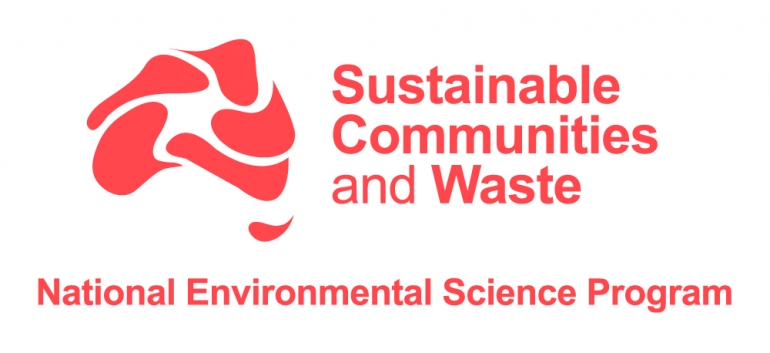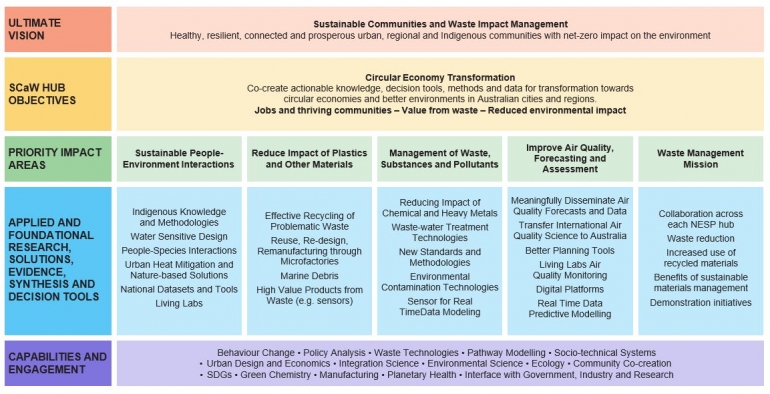The Sustainable Communities and Waste (SCaW) Hub is part of the second phase of the Australian Government’s National Environmental Science Program (NESP), a ground breaking program that has delivered practical environment outcomes through almost 400 successful science projects and helped to shape the nation’s environmental science agenda.
The Hub is hosted by UNSW and led by Australian Research Council Laureate Professor Veena Sahajwalla, a materials scientist, engineer, inventor and a founder and Director of UNSW’s Centre for Sustainable Materials Research and Technology (SMaRT).
The Hub will coordinate research on reducing the impact of plastic and enhancing sustainable people-environment interactions, develop ways to minimise impacts of hazardous substances and pollutants, and deliver cutting edge technical capabilities, particularly in the fields of waste and materials processing.
The Hub is a consortium comprising five world-class research institutions led by UNSW Sydney, working in partnership with the Commonwealth Scientific and Industrial Research Organisation (CSIRO), Monash University (MU), Curtin University (CU), and the University of Tasmania (UTas), and various industry partners.
Here is a link to the Government's announcement of the second phase of NESP, made 10 December 2020, which covered a total investment of $149 million from 2021-2027 across 4 new research hubs: the Sustainable Communities and Waste Hub, the Climate Systems Hub, the Marine and Coastal Hub and the Resilient Landscapes Hub.
Here is a link to the Hub site on the Government's NESP website.
Here is a link to a story about this Hub published by the Australian Financial Review (NB: this is a subscriber site).
NESP Hubs are funded and auspiced by the Department of Agriculture, Water and Environment (DAWE).
Our vision, operating model and research impact priorities
We work closely with DAWE and our many partners to identify shared outcomes through a co-designed national research program, delivered locally through our urban and regional networks, and in particular with Indigenous communities and networks.
The following links provide details about our research impact priority focus areas, vision and operating model, and further below is a news feed related to our SCaW Hub.
Our research will generate the evidence base for sustainable urban and regional development across the diverse social and ecological contexts of Australia. We will adapt the emerging Nature-based Solutions approach to the Australian context to support policy, planning, design, and management to enhance urban liveability, sustainability, and resilience. This will deliver ecological (e.g. biodiversity conservation), economic (e.g. green jobs), and social (e.g. health and well-being) benefits. We will weave and integrate scientific, local and indigenous knowledge and methodologies to support transitions to a more inclusive and just society, with improved environmental outcomes.
Guided by and informing National Waste Policy, we will bring our expertise to focus on local management solutions for problematic plastic and other waste materials (including low value plastics, packaging materials, soft plastics, multilayered polymer board, textiles, glass, paper, agriculture waste and tyres) and better understanding of environmental and social impacts. Embedded in circular economy principles, our research will go beyond materials recycling to product reuse, repurposing, re-design and remanufacturing. Catalysing end markets, we will drive innovation for increased manufacturing from recycled materials, boosting Australia’s manufacturing sector, jobs and prosperity, and reducing impacts on the environment and communities. An emerging industrial revolution will profoundly disrupt today’s centralised, vertically integrated model of production. The future of manufacturing lies in scalable, local technology such as our MicrofactorieTM that enable communities to produce many of the products, materials and resources they need locally by using resources largely derived from waste. Our MicrofactorieTM technology pioneered by UNSW will be leveraged to support opportunities for integration into existing mixed waste supply chains, to achieve scalability, adoption and to support the regional delivery of modular waste-processing.
Our research will minimise environmental and human health impacts through the assessment and prevention of contaminant releases, effective pollution management and appropriate reuse of chemical components and waste. We will define points of entry and waste contributions to pollution in the Australian environment, including for emerging chemicals of concern, and create new technologies to detect hazardous pollutants and to understand the modes of action, organism types, the challenges of mixtures, and acute and chronic effects. We will partner for data efficiency and accuracy, for data assimilation and prediction, driving common learnings for national consistency.
While air quality in Australia is generally very good, we continue to see significant health impacts from bushfire smoke, planned burns, wood-heaters, and local industrial pollution. Government departments responsible for air quality, fire and public health urgently need better information. The effective dissemination of information to the public is also critical, as highlighted during the recent 2019/20 bushfires when the public was unable to interpret air pollution information nor understand the implications for their health. Our research will meet these needs and provide new tools to monitor, manage and communicate air pollution to support better local planning decisions, empower communities, and maximise the benefit from investment from industry and all levels of government.
The Hub will also lead cross-hub coordination for the ‘waste impact management’ functional mission across the four new 2021 hubs to support decision maker policy development, program management and regulatory processes in both marine and terrestrial environments.
Our vision
- Create more sustainable communities and reduce waste impact through innovative, participatory, and circular-based planning, design and supply-chains.
- Transforming waste materials via new science to form the foundation of scalable and local waste to value solutions that are industry, end user focussed.
- Embracing reconciliation and greater caring for our unique ecosystems by working with our First Peoples to build enduring relationships and sustainable communities.
- Improving environmental outcomes through better management of waste, pollution and air quality.
- Increased prosperity and jobs creation by aligning and boosting Australia’s recycling and manufacturing capacity.
Our strategy, operating model and pathways to impact

